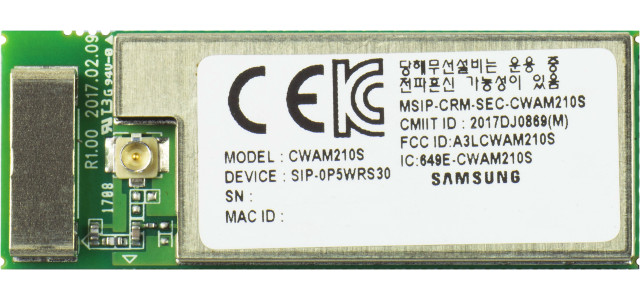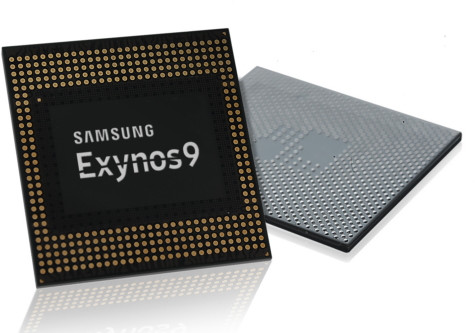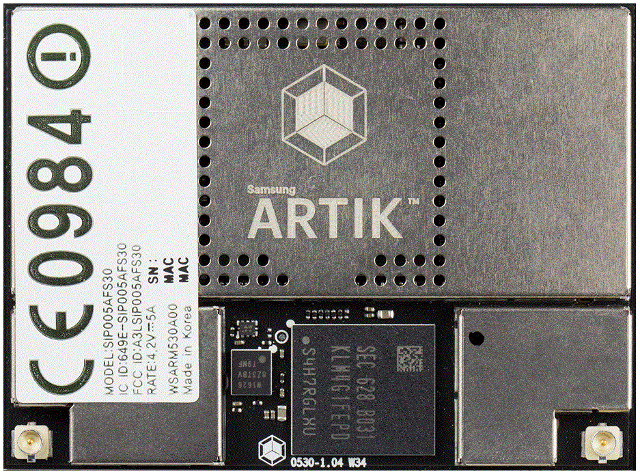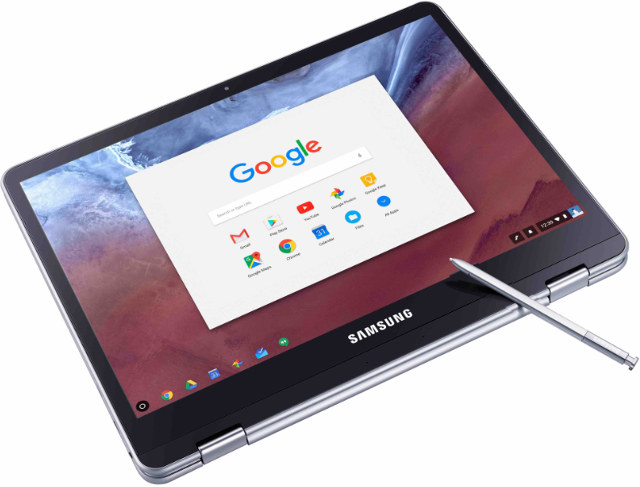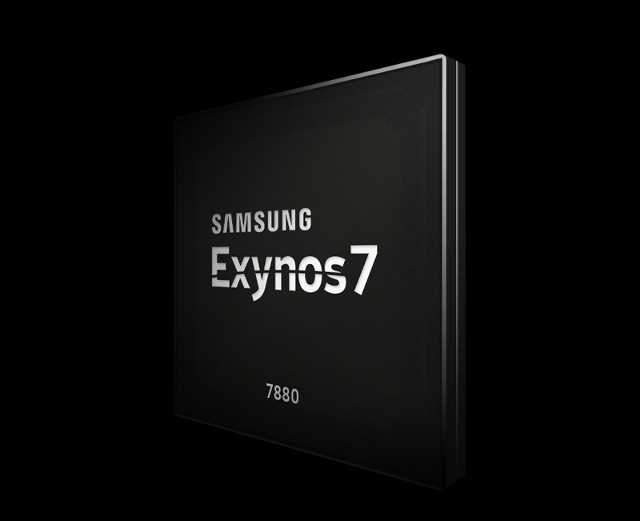Amazon Web Services (AWS) provides cloud computing services to manage & store data from IoT Nodes over the Internet, but in some cases latency may be an issue, and Internet connectivity may not be reliable in all locations. AWS Greengrass provides a solution to those issues by running some of the IoT tasks within the local network in ARM or x86 edge gateways running Linux. You can still manage your devices from AWS cloud, but a Linux gateway running Greengrass Core runtime will be able to run AWS Lambda functions to perform tasks locally, keep device data in sync, and communicate with devices running AWS IoT Device SDK. Greengrass benefits include: Response to Local Events in Near Real-time Offline operation – Connected devices can operate with intermittent connectivity to the cloud, and synchronizes with AWS IoT once it is restored Secure Communication – AWS Greengrass authenticates and encrypts device data […]
Samsung ARTIK 053 WiFi IoT Module Runs Tizen RT on an ARM Cortex R4 MCU
Samsung has just introduced the latest member of its Artik family at IoT World 2017. ARTIK 053 is a WiFi module powered by an ARM Cortex R4 wireless micro-controller @ 320 MHz with hardware based security, GPIO, SPI, and I2C ports, and running Tizen RT real-time operating system. Artik 053 module specifications: MCU – 32-bit ARM Cortex R4 @ 320MHz with 1280 KB RAM for general use, 128 KB RAM for global IPC data (likely Samsung Exynos i T200, or a variant without an ARM Cortex M0+ core) Storage – 8 MB flash Connectivity – 802.11 b/g/n WiFi @ 2.4 GHz Expansion – 29 dedicated GPIO ports, 2x SPI, 4x UART (2-pin), 4x ADC, 1x JTAG, 2x I2C Security – AES/DES/TDES, SHA-1/SHA-2, PKA (Public Key Accelerator), PRNG/DTRNG (Random Number Generators), Secure key storage, Physical Unclonable Function (PUF) Power Supply – 5 to 12VDC input voltage Dimensions – 40 x 15 x […]
Samsung & Amazon Introduce HDR10+ Standard with Dynamic Metadata & Tone Mapping
Most recent 4K Ultra HD televisions support high dynamic range (HDR) through standards such as HDR10, Dolby Vision, or Hybrid Log-Gamma (HLG). Samsung and Amazon have jointly introduced an update to HDR10 with HDR10+ that adds dynamic tone mapping & metadata. The companies describe the issues for HDR10′ static metadata as follows: The current HDR10 standard utilizes static metadata that does not change during playback despite scene specific brightness levels. As a result, image quality may not be optimal in some scenes. For example, when a movie’s overall color scheme is very bright but has a few scenes filmed in relatively dim lighting, those scenes will appear significantly darker than what was originally envisioned by the director. HDR10+ will be able to adjust metadata for each scene, and even for each frame, hence solving the issue of darker scenes. If you already own a Samsung TV with HDR10, it’s not […]
Samsung Galaxy S8 & S8+ Smartphones Launched with Infinity Screen, Samsung DeX Desktop Mode, Bixby Assistant
Samsung has finally launched their latest Galaxy S8 and S8+ smartphones powered by Qualcomm Snapdragon 835 or Exynos 8895 processor, 5.8″ and 6.2″ screens , and some of the most interesting features include the “infinity screen” with ultra thin bezels, Samsung DeX allowing for a desktop experience on a large monitor when the phone is docked, as well as Bixby assistant. Samsung Galaxy S8/S8+ specifications: SoC (one or the other depending on markets) Qualcomm Snapdragon 835 octa-core processor with four Kryo 280 cores @ 2.3 GHz, four Kryo 280 cores @ 1.7 Ghz;; Adreno 540 GPU; 10nm process Samsung Exynos 8895 octa-core processor with four M2+ cores @ 2.35 GHz, four Cortex A53 cores @ 1.9 GHz, ARM Mali-G71 GPU; 10nm process System Memory – 4GB LPDDR4 Storage – 64GB UFS 2.0 flash; micro SD up to 256 GB Display Galaxy S8 – 5.8” quad HD+ (2960×1440), (570ppi) Galaxy S8+ […]
Samsung Launches Exynos 9 Series 8895 SoC with Custom ARMv8 Cores, Mali-G71 GPU, Gigabit LTE Modem, 10nm FinFET Process
Samsung Electronics has just announced the launch of its latest Exynos application processor (AP), with Exynos 9 Series 8895 octa-core processor with four second generation custom designed ARMv8 CPU cores, and four Cortex A53 cores, as well as a Mali-G71 3D GPU, and a Gigabit LTE modem. The LTE modem delivers data throughput at up to 1Gbps (Cat.16) downlink with 5CA (five carrier aggregation), and 150Mbps (Cat.13) uplink with 2CA. The SoC also embeds an “advanced MFC” (multi-format codec) for recording and playback at up to 4K UHD at 120 fps, a Vision Processing Unit for video tracking, image process, and machine vision technology, and another processing unit allows for mobile payments using iris or fingerprint recognition. Exynos 8895 is also the first application processor manufactured with 10-nanometer (nm) FinFET process technology and improved 3D transistor structure, which according to Samsung, allows for up to 27% higher performance, while consuming […]
Samsung Introduces Artik 530 IoT Module & Development Kit with WiFi, BLE, and Zigbee/Thread
Samsung unveiled Artik 1, Artik 5, and Artik 10 IoT modules & development board families in 2015, but since then they dropped the Artik 1 family, and instead launched Artik 0, Artik 5, and Artik 7 modules and boards late last year. More recently the company canceled the more powerful Artik 1020 development board, but the Artik project is still going on, as they’ve just added Artik 530 module & development kit to their Artik 5 family. Samsung ARTIK 530 module specifications: SoC – Unnamed Quad core ARM Cortex A9 processor @ 1.2 GHz with a 3D graphics accelerator System Memory – 512 MB DDR3 Storage – 4GB eMMC v4.5 flash Connectivity – Dual band SISO 802.11 a/b/g/n WiFi, Bluetooth 4.2 LE + Classic, 802.15.4/Zigbee/Thread, 10/100/1000M MAC (external PHY required) Other Interfaces and peripherals Camera – 4-lane MIPI CSI up to 5MP (1920×1080 @ 30fps) Display – 4-lane MIPI DSI […]
Samsung Chromebook Plus / Pro with ARM Based OP1 / Intel Core m3-6Y30 Processor to Sell for $449 and Up
Samsung Chromebook Pro was first discovered last October on some reseller’s website with a Rockchip RK3399 hexa-core processor, 4GB RAM, and a $499 price tag. The company has finally announced two new Chromebooks at CES 2016 with Chromebook Pro actually based on an Intel Core m3-6Y30 “Skylake” processor, and Chromebook Plus powered by “OP1” hexa-core ARM Cortex-A72/A53 processor. We’ll that apart from the different processor, both new Chromebook have exactly the same specifications Model Code XE513C24-K01US XE510C24-K01US Chromebook Plus Chromebook Pro Operating System Google Chrome Processor / Chipset OP1, Made for Chromebooks. Hexa-core (Dual A72, Quad A53) Intel Core M3 Processor 6Y30 (0.90 GHz up to 2.20 GHz, 4 MB L3 Cache) Graphic Internal Graphics Intel® HD Graphics 515 Display 12.3″ 2400×1600 LED Display (3:2 aspect ratio) with Touch Screen Panel Memory 4GB LPDDR3 Memory (on BD 4GB) Hard Drive 32GB e.MMC Color Platinum Silver Multimedia Internal Dual Array Digital […]
Samsung Exynos 7880 Octa-core Processor is Designed for Mid-Range LTE Smartphones
Samsung has recently introduced a new Exynos 7880 octa-core ARM Cortex A53 processor with an ARM Mali-T830MP GPU, and an LTE Cat. 7 modem designed for mid-range smartphone. Samsung Exynos 7880 key features CPU – Octa-Core ARM Cortex-A53 processor @ up to 1.9GHz GPU – ARM Mali-T830 MP3 Memory – LPDDR4 Storage – eMMC5.1, UFS 2.0, SD Card Display – Up to WQHD (1,440×2,560) LTE Modem – LTE Category 7; 3CA (Downlink) up to 300 Mbps, 2CA(Uplink) up to 100 Mbps, FDD-TDD Joint CA GNSS – GPS, GLONASS, BeiDou Camera – Rear up to 21.7MP, Front up to 21.7MP Video – UHD 30fps (FHD 120fps) recording and playback with HEVC (H.265), H.264 / playback with VP9 Process – 14nm FinFET Process The processor will first be used in Samsung Galaxy A5 (2017) and Galaxy A7 (2017) smartphones. A few more details about the processor may be found on the product […]



